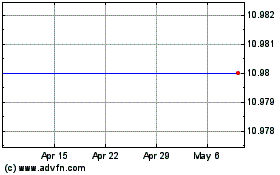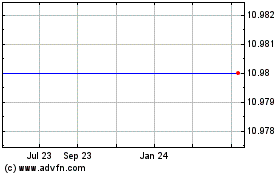IronSource Gets $11 Billion Valuation in SPAC Merger, Betting on Ads in Mobile Games
March 23 2021 - 2:02PM
Dow Jones News
By Parmy Olson
Pandemic demand for videogames and consoles has lifted share
prices for game developers and their suppliers. Now, investor
enthusiasm is permeating deeper into the plumbing of the global
game industry.
Israeli startup ironSource Ltd., which provides advertising
services for app-based game developers such as Activision Blizzard
Inc., agreed on Sunday to merge with a special purpose acquisitions
company, or SPAC, in a deal that will take it public, valuing it at
$11.1 billion.
A string of game companies have sought to tap public markets as
lockdowns have driven demand for in-home entertainment. Shares of
Roblox Corp., a popular videogame platform for children, soared in
their public debut this month. Shares in Playtika Holding Corp., an
Israeli game developer that makes social casino games such as
"Caesars Slots" and "Poker Heat," jumped in its market debut in
January. Discord Inc., a chat service popular with gamers, roughly
doubled its valuation, to $7 billion, in a funding round late last
year.
The surge in demand for games has benefited larger tech
companies, too. Sony Corp. said its operating profit for the
quarter ended in December rose 20% thanks to growth in its games
divisions. Its shares are up 103% in the past 12 months.
Microsoft Corp. recently posted record quarterly sales, helped
by stronger demand for videogames and the release of
next-generation Xbox consoles.
Activision shares have shot up 63% in the past 12 months.
Electronic Arts Inc. stock is up 38% in the past year, while Zynga
Inc.'s shares have risen 60%.
Surging demand for games has been a mixed blessing for some. A
global shortage of computer chips, fueled in part by the sharp
increase in demand for games and the graphics chips that power
them, has hampered global production of smartphones and game
consoles such as Sony's PlayStation.
App-based games -- different from those played at home on
personal computers or consoles -- have also boomed. Global spending
on videogame software surged 20% in 2020, to $175 billion,
according to industry tracker Newzoo BV. Mobile games made up about
half of last year's spending, it found. Of the $143 billion
consumers spent on apps last year, $100 billion went to games,
according to market intelligence firm App Annie.
IronSource makes games, too, including the popular mobile puzzle
game "Sort It 3D." But its main business is connecting app makers,
particularly those in games, with advertisers. The company says its
system is used by 87% of the top 100 most downloaded mobile games,
including Activision's "Candy Crush Saga" and the mobile edition of
its popular "Call of Duty" franchise. It also counts Zynga, the
maker of "Words With Friends," as a client.
IronSource sells analytics tools to app developers, allowing
them to see how people are using their app -- for instance, how
often they open the app and which ads they are spending the most
time on. The app makers can also use the service to integrate
various mobile advertising networks, such as Google's AdMob, into
their apps. That network will then show ads to users.
IronSource says its services help an app maker determine which
of several competing ad networks would be most appropriate, and
lucrative, for any individual app. It could, for instance,
recommend networks that provide video ads and "playables," demos of
games that users play inside other games. IronSource takes a cut of
revenue from the ads.
Playables are a relatively nascent ad technology. Here is how
they work: If a player of "Call of Duty: Mobile," a first-person
shooter game, wants to buy new weapons but doesn't have any in-game
currency, the player can opt to play a 30-second demo of another
game inside "Call of Duty." That demo earns the player in-game
currency.
IronSource said it recently started providing technology that
can automate the creation of such minigames and calibrate how
challenging they are. If a user installs the game after trying it
out in a playable, the game maker behind the demo pays "Call of
Duty"-maker Activision, through ironSource. IronSource takes a cut
of that revenue.
As part of its deal to go public through a SPAC, ironSource said
2020 revenue grew 83% over the previous period, to $332 million. It
said it expects to have approximately $740 million of unrestricted
cash once the deal is completed.
IronSource's merger deal is with Thoma Bravo Advantage, a SPAC
that trades on the New York Stock Exchange under the symbol TBA.
Tiger Global Management LLC and Wellington Management Co. are
investing in the deal.
The SPAC was formed by individuals affiliated with Thoma Bravo
LP, a private-equity firm focused on software investments and
co-founded in 2008 by Puerto Rican billionaire Orlando Bravo.
SPACs are shell companies that raise money in a public offering
and then look for a private firm to acquire. They have exploded in
popularity as a quicker route for companies to go public, without
many of the constraints of a traditional IPO.
Write to Parmy Olson at parmy.olson@wsj.com
(END) Dow Jones Newswires
March 23, 2021 13:47 ET (17:47 GMT)
Copyright (c) 2021 Dow Jones & Company, Inc.
Thoma Bravo Advantage (NYSE:TBA)
Historical Stock Chart
From Mar 2024 to Apr 2024

Thoma Bravo Advantage (NYSE:TBA)
Historical Stock Chart
From Apr 2023 to Apr 2024
